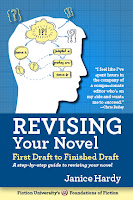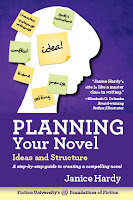Writing a novel is only the first step to getting published. Believe it or not, it's the easiest step. But once it's done, what do you do next? Here's a checklist to help you get from first draft to first query sent.
1. Polish your manuscript until it shines.
Seems simple, I know, but it's easy to want to send it off right away, but don't rush it. Use your critique group, beta readers, whatever resources you have to check your work and make sure it reads as smoothly as it can.
2. After it's all shiny, let it sit while you start researching agents.
Agent Query is a great start. Make a list of every agent who represents the type of book you've written. Check out their websites and blogs to get a feel for who they are and what they like. Cross off any who aren't the right fit for you, highlight any who are good fits for you.
3. Take your list and check Writers Beware.
Get rid of any agent who shows up here with a warning. Make note of those who show up with recommendations.
4. Work on your query letter.
This is an important letter, so don't rush it either. Spend time on it to get it right. Pub Rants has a great writing your pitch series. Query Shark is a great way to see what others have done and what an agent thought. Once your query is perfect...
5. Set aside the query and write the synopsis.
Unless you're very lucky, you'll probably have to submit a synopsis at some point. Some agents request one page, others three, and some three to five. If you can bear it, writing one of each ensures you have what you need, when you need it.
6. Read your novel one more time.
You've gotten some distance now since it's been a month (or more) since you last read it. You'll spot things you wouldn't have before. Fix what you see. If there's a lot, set it aside for another month. If it's ready to go...
7. Start sending off your submission packages.
Each agent will want something specific, so follow their guidelines and send what they ask for. I sent my queries in batches of 6-8 so I could change them if I didn't get any responses, but you could send them all at once too.
8. Wait.
This is one of the hardest parts. Publishing moves slowly, so it's a good time to start getting used to it. To keep your mind off it, start another book, or write some short stories, or just take a break from writing if you need one.
Pre- and Post- 1-8. Starting reading up about the industry.
The more you know about the industry and the agents you'll be querying, the better off you'll be. You can get a lot of information online and this can help you find the right agent for you, and get a better sense of what they want. Follow agent and editor blogs, subscribe to the free Publishers Marketplace Lunch newsletter, read some trade blogs, sites, and publications.
There are a lot of helpful links under the online resources tab, and each of them will also have links to other blogs and sites. Find the ones that focus on your genre and market, but don't ignore ones that don't. Bookends wasn't an agency I queried because they don't represent what I write, but their blog is fantastic and very helpful for writers in general. Same with Rachelle Gardner's.
I'd say relax and try not to stress, but I know firsthand that's impossible. So try not to stress too much. And good luck.
What do you do to prepare yourself for querying?
 Looking for tips on revising your novel? Check out my book Revising Your Novel: First Draft to Finished Draft,
a series of self-guided workshops that help you revise your manuscript
into a finished novel. Still working on your idea? Then try my
just-released Planning Your Novel Workbook.
Looking for tips on revising your novel? Check out my book Revising Your Novel: First Draft to Finished Draft,
a series of self-guided workshops that help you revise your manuscript
into a finished novel. Still working on your idea? Then try my
just-released Planning Your Novel Workbook.  A
long-time fantasy reader, Janice Hardy always wondered about the
darker side of healing. For her fantasy trilogy The Healing Wars, she
tapped into her own dark side to create a world where healing was
dangerous, and those with the best intentions often made the worst
choices. Her novels include The Shifter, Blue Fire, and Darkfall from Balzer+Bray/Harper Collins. The Shifter,
was chosen for the 2014 list of "Ten Books All Young Georgians Should
Read" from the Georgia Center for the Book. It was also shortlisted for
the Waterstones Children's Book Prize, and The Truman Award in 2011.
A
long-time fantasy reader, Janice Hardy always wondered about the
darker side of healing. For her fantasy trilogy The Healing Wars, she
tapped into her own dark side to create a world where healing was
dangerous, and those with the best intentions often made the worst
choices. Her novels include The Shifter, Blue Fire, and Darkfall from Balzer+Bray/Harper Collins. The Shifter,
was chosen for the 2014 list of "Ten Books All Young Georgians Should
Read" from the Georgia Center for the Book. It was also shortlisted for
the Waterstones Children's Book Prize, and The Truman Award in 2011.  Janice is also the founder of Fiction
University, a site dedicated to helping writers improve their craft.
Her popular Foundations of Fiction series includes Planning Your Novel: Ideas and Structure, a self-guided workshop for planning or revising a novel, the companion Planning Your Novel Workbook, Revising Your Novel: First Draft to Finished Draft, and the upcoming Understanding Show Don't Tell (And Really Getting It).
Janice is also the founder of Fiction
University, a site dedicated to helping writers improve their craft.
Her popular Foundations of Fiction series includes Planning Your Novel: Ideas and Structure, a self-guided workshop for planning or revising a novel, the companion Planning Your Novel Workbook, Revising Your Novel: First Draft to Finished Draft, and the upcoming Understanding Show Don't Tell (And Really Getting It). Website | Facebook | Twitter | Goodreads | Amazon | Barnes & Noble | iTunes | Indie Bound


Sigh. That's a lot of waiting. Necessary, I know, but I seem to be filling the gaps with ice cream.
ReplyDeleteLOL, that works. I find chocolate truffles helps too. And popcorn. And cheeseballs.
ReplyDeleteMmm, I'm getting hungry. Maybe your next post could be on how not to gain 50 lbs during the submission process...
ReplyDeleteThanks for all your informative posts - I really enjoy your blog!
Ah see, now that's the good part. You're so stressed about waiting, you burn off all those calories through sheer nervousness. (and thanks!)
ReplyDeleteBetween steps 7 and 8 though, often the feedback you get from an agent will send you back to 1 and then you start the cycle all over again. This is the part that has been difficult for me...learning when to know if you've really shined it up enough ..and when to know that your story is indeed whole, complete and taken a life of its own. New feedback is always helpful, but it takes time and experience as a writer to gain confidence, to be firm enough with your voice and vision to know when to let go. Every agent, every editor and every reader will have some critique to offer and in order to take the next step after you've completed your novel, you have to not just patiently wait, but quell those voices and hear your own.
ReplyDeletemmm. yep i think janice and tracey have it right, if they surveyed the ranks of yo-yo dieters us writers would be right in there.
ReplyDeleteWe write and we're distracted, whilst we wait we eat!
:-)
Even more impossible than getting an obscure science paper to publication. Impossible? No, I mean challenging of course >:D
ReplyDeleteCold As Heaven
It is definitely a process that requires patience. Nice to have it all listed out. Thanks!
ReplyDeleteI am in that boat right now! I don't like waiting, so I started another manuscript. And I go shopping!
ReplyDeleteWaiting is hard, and then the rejections!
ReplyDeleteSometimes the waiting was worse than the actual rejections.
ReplyDeleteI wrote an article about this process, but I like your descriptions better :)
ReplyDeleteI wonder that you didn't mention "finding a beta reader" or "hire a proofreader/freelance editor to give feedback". Do you consider these things nice-to-haves-but-not-necessary or do you not recommend them here for some other reason? If it's not clear, wondering because that was my planned step 1 once my novel is finished.
ReplyDeleteLas Vegas Writer: Aw, thanks!
ReplyDeleteAmber: Good point and I'm going to go back right now and add that in, thanks! That was implied in the polish it til it shines, but it's worth being specific there.
Personally, with the option of uploading to Kindle or even posting chapters on a website, I don't see a reason to wait. Besides, with published titles Twilight, 50 Shades of Gray... and others, if that crap can get published and turned into movies - I don't see a reason to trust the publishing industry myself.
ReplyDeleteI've read stories on Kindle for .99 and they were ten times better than some of the waste that's been coming out from the publishing houses. Who's picking this stuff up? I've read fan fictions that were better written!
I'm all for editing, revising and polishing - but I'm also for getting it out there to the readers that it's meant to reach. I was published several decades ago and it took forever to get a story to the reader. Today, a writer can take out the middleman.
I figure, the stories written are for readers... to give a gift of adventure, mystery or share something special with along the way. So why is it that we tend to show stuff to other writers, editors and those involved in writing? Shouldn't we offer it to actual readers, the ones for whom it's written for?
I'll take a 11 year old reader's opinion of my 9-12 year old mystery tale over a 53 year old writing teacher or 46 year old editor's opinion. I wasn't writing it for them, I wrote it for my audience. No one but that audience is going to give you a better view into your story. Because they are the ones that are going to buy it and read it.
I used to do the publishing thing traditionally, but I've been watching, studying and deciding how to come back to the printed word. Frankly, I think I'm going to go digital and see what the readers think about my stories.
From the sound of it, I can save myself about 50lbs of misery by moving ahead instead of waiting around for someone to tell me my stories good enough or not. I haven't got time like that to be wasting, I've stories to tell... they aren't going to write themselves.
That's a totally valid path (and it reminds me that it's time to update this older post with the indie path). Publishing has changed, and how we get our stories out there has changed, too. Not every writer wants to go with a traditional publisher and indie authors can, and do, very well on their own.
Delete